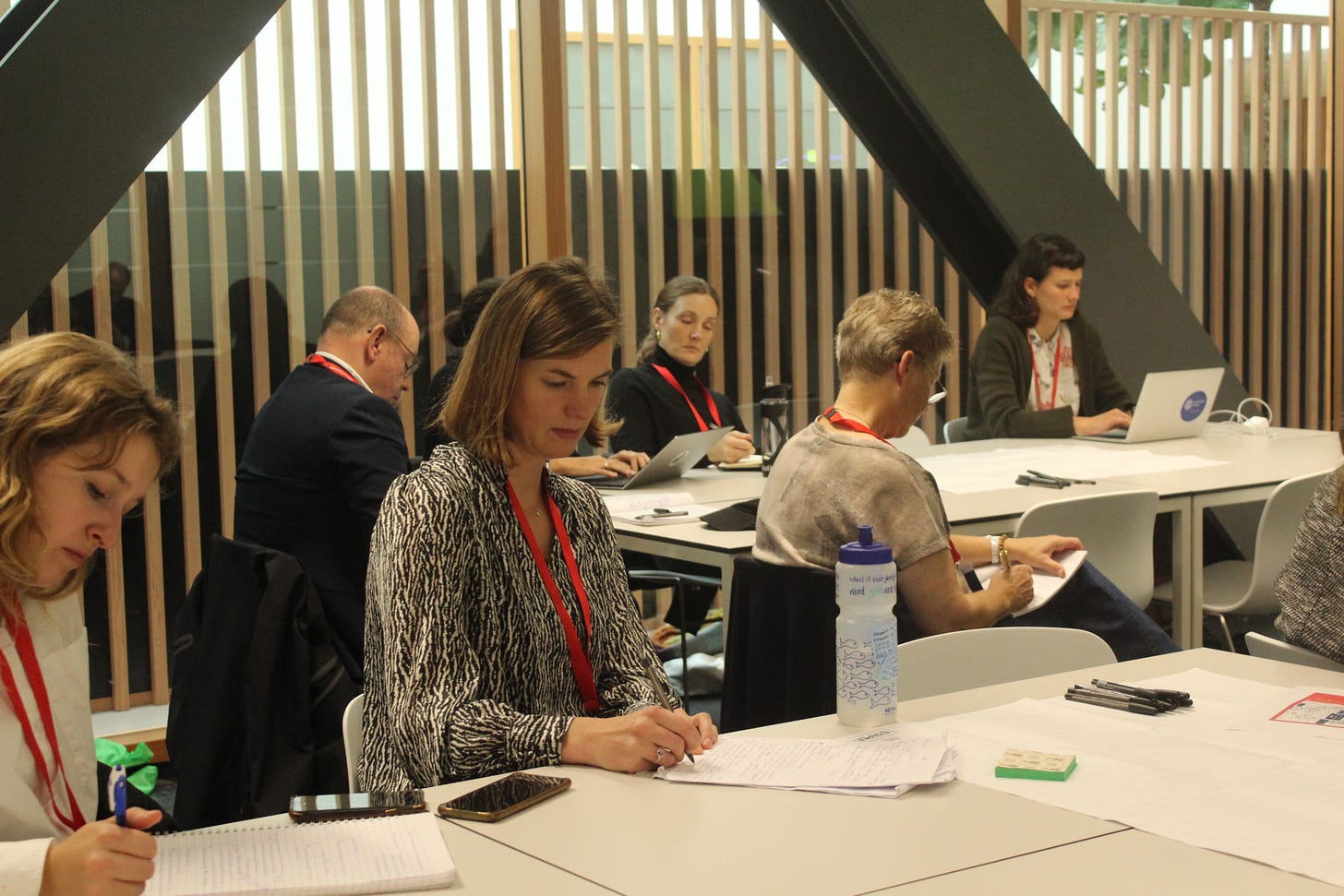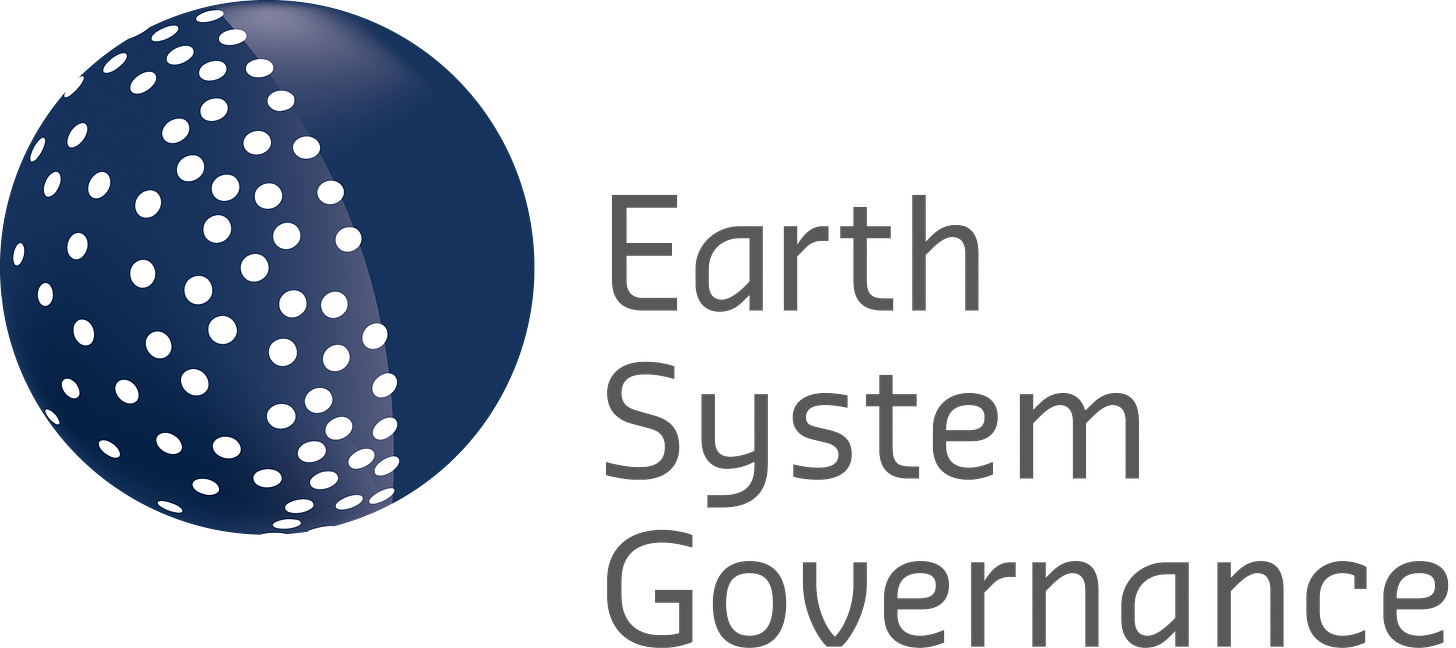Transformative change: leading with love, collaborating for opportunities
Pondering over the role of research in fostering sustainability transformations
Author bio: Evi Sengers is a MSc student of Environment and Society Studies at the Radboud University and a policy advisor at the Green Metropolitan Region Arnhem-Nijmegen. She is writing her thesis on the transformative governance capacity of the regional government for biodiversity action.
Bringing inspiration to an otherwise grey and rainy Wednesday morning, the second day of the 2023 Radboud Conference on Earth System Governance saw a gathering of researchers and practitioners during the session titled “How can ESG Research Contribute to Transformative Change for Climate & Biodiversity?” The session was chaired by Harriet Bulkeley and Esther Turnhout and included a panel discussion with Eloisa Vittoria Menguzzo, Shuaib Lwasa and Eefje Cuppen, each representing different areas of expertise within the science-policy interface on earth system governance. Stacy VanDeveer and Michele Betsill wrapped up the session by offering their reflections on the points raised during the discussion.
What attracted me to write about this session were the crucial questions it posed: what makes transformative change, transformative? What are the opportunities and challenges in fostering transformative change in practice? And, what do practitioners need from research in order to effectively steer and implement transformative change? As a rookie in the field of climate and biodiversity governance, I find that these questions are difficult to wrap my head around but keep my mind occupied as I travel back and forth in the gap between theory and practice. Fortunately, open and reflective discussions like the one in this session provide some insightful first guidelines on how to bridge this divide to support climate and biodiversity action.
Transformative change = the rhino in the office
Transformative change is rapidly gaining attention in scientific and popular debates. However, the concept is still shrouded in confusion, displayed not only in your uncle’s dazed look as you try to explain your research topic, but also in the different interpretations of the term in the science-policy interface for sustainability. Arguably, transformative change can be distinguished from incremental change because it has a fundamentally different starting point. Instead of only tackling environmental problems at the symptom-level, transformative change takes place when people and institutions address the root causes of these problems. As highlighted by the panellists, this entails changing the underlying values and goals of endeavours such as private investments and technological innovation programmes. It entails changing the norms and parameters with which we evaluate and stimulate these endeavours, shifting the emphasis from economic growth above all else to social and ecological wellbeing for everyone, and not just the rich and happy few.
It seems to me that at its core, transformative change is about leading with love: to design our institutions and practices out of a place of appreciation and compassion for other animals and the ecosystems that support us. This is not bureaucracy, technocracy, no cold mission – this is hard but heartfelt work, rewarding even in places where you would least expect it. As nicely highlighted by Eloisa Vittoria Menguzzo’s anecdote, transformative change is the joy of working on rhino conservation in a pension fund office: “we are in a financial institution and we are talking about rhinos?!” It these unlikely but positive alliances at the level of values and parameters that make the work meaningful and the change transformative.
From pathologies- to opportunities-driven research
This sounds nice, of course, but steering transformations is undoubtedly incredibly challenging because of the required value changes and resulting political decisions that have to be made. The panellists shared about some of the struggles that they face in putting transformative change into action, relating to positionality and responsibility. For example, how activistic can a research institution be in its communication and output? Or, what mandate does a civil servant in local government have to lobby for phasing out environmentally harmful industries in the municipality? And which parties have the responsibility to pay for the transition costs?
The session’s participants agreed that ESG research has a key role to play in answering these questions. To prevent the concept of transformative change from ‘sliding into a bucket’ where it is either forgotten or used for greenwashing purposes, science has to go beyond abstract proverbs like ‘the financial system needs to change’. It should engage with and foster knowledge on the values, politics and difficult processes involved with transformative interventions as they are happening in practice. However, if science is to become a driving force in transformative change, it also has to address the pathologies that are inherent to science itself.
One of the pathologies identified by Shuaib Lwasa is the often narrow focus on solutions. A prominent way of doing research is to identify a problem and then proposing solutions to this problem through a universal framework. This approach neglects the fact that transformative change is radically context- and place-based – what interventions need to be made in a community or governance mix is heavily dependent on the context. Instead of pursuing generalization, research may employ an opportunities-driven focus by diagnosing leverage points in a specific case which might be applicable across environments and disciplines. What resources and opportunities are already there and how could they be harnessed, here and elsewhere?
In addition to this perceived pathology in research focus, the session’s participants also discussed the toxic traits of academic culture and how they inhibit scientific contributions to transformative change. Science, how it is organised, mobilised and funded, often contributes (unwittingly) to the very environmentally harmful practices it warns against. Moreover, the competitive nature of publication processes and the preference for certain types of methodologies and knowledges hinder meaningful collaboration for transformative change. Inter- or transdisciplinary knowledge exchange between practitioners and researchers can be a fruitful way forward, provided it is set up not from a science-perspective, but also out of ambition to help practitioners shift values, parameters and practices.
From symptoms to rhinos and from pathologies to opportunities, science has a key role to play in transforming itself and the wider societal conditions it is embedded in. I have learned that there is still much work to be done to bridge the gap between practice and theory – I think the ESG community might be a resourceful and devoting breeding ground for this task. I will be looking forward to it from across the hopefully-disappearing divide.
About the Earth System Governance Project
The Earth System Governance Project is a global, interdisciplinary research network advancing knowledge at the interface between global environmental change and governance. The project aims to explore political solutions and novel, more effective governance systems to cope with global environmental change. You can connect with this network by becoming a research fellow, joining a taskforce or working group, or publishing with one of our publication outlets.




